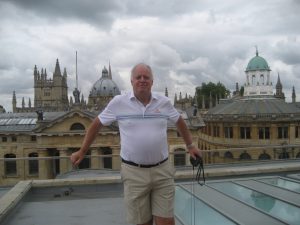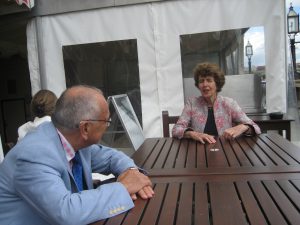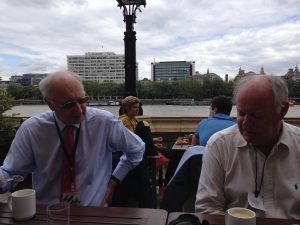At Ashley’s school in San Jose, CA. October 2016
(James, Alyssa, Ashley, Coldspur, Julia, Alexis & Sylvia)
In my Commonplace Book of 2008, I recorded the following nugget: “There is no greater nonsense than that uttered by a Nobel prize-winning economist in a mood of moral indignation”, attributing the apothegm to ‘Anon.’. But that was pure invention: I had actually come up with the saying myself, and indulged in a bit of subterfuge to give it a bit more authority. If the World watched, however, it said nothing.
I can’t recall what particular speech or article had prompted my expostulation, but the trend goes back a long way, with Karl Marx the obvious prototype, even though not all economists’ absurdities are expressed in a mood of moral indignation. John Maynard Keynes died before the Nobel Prize for Economics was instituted, but his contribution: “In the long run, we are all dead” is a good place to start. It was either an unimaginative truism, or else a colossal lie, in that, while he and all his Bloomsburyites would indeed be dead within a decade or two, the heritage that he and his acolytes would leave behind would dog future generations, and there is nothing easier for politicians to do than leave a legacy of debt to posterity. One notorious example who did catch my attention was the 1992 Nobelist, Gary Becker. He once wrote a piece for Business Week (I have it somewhere in my clippings files), which recommended that housewives ̶ he may have called them ‘homemakers’ ̶ should be paid for the work they did. It must have been utterances like this that caused the New York Times to dub Becker ‘the most important social scientist of the past fifty years’, as it reflects a tragic confusion in the economist’s brain between Effort and Value. Moreover, who would check whether the housework was done properly? If the government were to pay housewives for their contributions, it would need a Bureau of Domestic Affairs to be set up, with supervisory rights, inspection capabilities, a system of fines, as well as all the trappings of equal opportunity hiring, overtime pay, health care benefits, proper vacations and pensions for all its employees. Who would be paying for all this? One might as well suggest that I should be paid to do the gardening or the yardwork.
And then there’s Paul Krugman, whose ‘progressive’ rants (yes, that’s how he classifies himself, as if everyone who disagrees with him is some regressive Neanderthal – not that I have any bias against the Neanderthal community, I hasten to add, as most of them were upstanding characters, with reliable opinions on such matters as free childcare and climate change, and actually passed on some of their genes to me), appear regularly in the New York Times. Krugman ̶ the 2008 laureate ̶ once famously said that the US National Debt (now standing at about $19 trillion), is not a major problem, ‘as we owe it to ourselves’. In which case, one might suggest: ‘why don’t we just write it off’? I am sure we wouldn’t mind. Krugman lives in a Keynesian haze of 1930, and is continually arguing against austerity, and recommending that now is the time to increase the debt even further by ‘investing’ (note the leftist economist’s language: government spending is always ‘investing’, not ‘spending’) in infrastructure and education in the belief that this will get the economy ‘moving’ again, and foster wealth-creation, not just consumption. Keynes in fact recommended increasing government spending during times of recession, and putting it away when times were good, when the rules of national and global economics were very different from what they are today. The policy of today’s leftist economists seems to be to encourage governments to spend a lot when times are good, and even more when times are bad, criticizing any restraints on spending as ‘the deficit fetish’ (see Labour MP Chris Mullin in the Spectator this month).
So next comes along Joseph E. Stiglitz, the 2001 Prize recipient. Earlier this year he published “The Euro: How A Common Currency Threatens the Future of Europe”, which I think is an absolutely muddle-headed and irresponsible project. Not that he doesn’t bring an honest concern to bear on the perils of the euro, but a) sensible persons (including me) have been pointing out for ages that financial integration is impossible without political integration, so the overall message is nothing new; and b) it is not clear whether he is talking about the future of the European Union or Europe itself, or why the health of ‘Europe’ is tied to a shared currency. Worry not: the flyleaf informs us that the guru ‘dismantles the prevailing consensus around what ails Europe, demolishing the champions of austerity while offering a series of plans that can rescue the continent – and the world – from further devastation.’ Apart from the fact that, if there is a ‘consensus’ about what ails Europe, his would be a lone voice in the wilderness, one can only marvel at his hubris.
Stiglitz shows he does not understand what he calls ‘neoliberalism’, the belief in the efficacy of free markets, at all. He characterizes neoliberalism as ‘ideas about the efficiency and stability of free and unfettered markets’, and wants to bring the power of the regulator – him who knows best – to address the instability of markets. ‘With advances in economic science [sic], aren’t we supposed to understand better how to manage the economy?’, he inquires in his Preface, without specifying what he regards as ‘the economy’ – the total output of all the countries of Europe? ̶ or why he claims economics is a ‘science’. And, if he is a Nobelist, shouldn’t he be answering such questions, not posing them rhetorically? (This month, Janet Yellen, the chairwoman of the US Federal Reserve, expressed the following alarming concern: “The events of the past few years have revealed limits in economists’ understanding of the economy and suggest several important questions I hope the profession will try to answer.” From his recent see-sawing, Mark Carney, the governor of the Bank of England, appears to be similarly bewildered. Over to you, Joseph.) But markets are inherently unstable: that is why they are markets. Joseph Schumpeter was the economist who introduced the notion of ‘creative destruction’ to explain how previously dominant players can be swept away by innovation and organizational sclerosis. Such ideas disturb econometric regulators like Stiglitz: they would prefer to have a clearly defined number of players in a market, allow them to make enough profit to keep their investors happy, but ensure that there should be enough competition for each to keep on its toes, but not so much that any individual company should actually fail. Yet such a set-up quickly drifts into crony capitalism, like the US health insurance ‘market’, where supporters of President Obama’s disastrous Affordable Care Act admit that the role of the regulators is to keep insurance companies solvent. Or politicians meet with ‘business leaders’ in the belief that they are discovering what ‘business’ wants; today’s ‘business leaders’ know very well that they do not represent the interests of a competitive market, but gladly go along with the pretence, and look for favours to protect them from the upstarts. Be very wary when journalists (or politicians) start talking about ‘the business community’: it proves they don’t get it.
What is more, Stiglitz demonises his intellectual foes. Even though their ideas have been ‘discredited’, ‘they are held with such conviction and power, immune to new contrary evidence, that these beliefs are rightly described as an ideology’. (p 10) Unlike his own ideas, of course, which are naturally ‘scientific’. “Modern scientific [sic!] economics has refuted the Hooverite economics I discussed in the last chapter.” (p 54) “Doctrines and policies that were fashionable a quarter century ago are ill suited for the 21st century”, he continues (p 269), but he quickly adopts the Keynesian doctrines of eighty-five years ago, without distinguishing what is fashion and what is durable. (Keynes made some notoriously wrong predictions, especially about automation and leisure.) People who disagree with Stiglitz are madmen: “Today, except among a lunatic fringe, the question is not whether there should be government intervention but how and where the government should act, taking account of market imperfections.” (p 86: his italics) Yet it is clear that, while he denigrates the designers of the Euro for applying free-market economics to the reconstruction of Europe’s economies, categorising them as ‘market fundamentalists’ is utterly wrong. Those architects may have believed, as Stiglitz claims, that ‘if only the government would ensure that inflation was low and stable, markets would ensure growth and prosperity for all’, but such an opinion merely expresses a different variation on the corporatist notion that governments can actually control what entrepreneurialism occurs within its own borders. After all, as Stiglitz admits, the chief architect of the European Union and the euro was Jacques Delors, a French socialist.
The paradoxes and contradictions in Stiglitz’s account are many: I group the dominant examples as follows:
1) Globalisation: For someone who wrote “Globalization and its Discontents”, Stiglitz is remarkably coy about the phenomenon in this book. The topic merits only three entries in the index, much of which is dedicated to some waffle about ‘the global community’. For, if globalization is an unstoppable trend, it must require, in Stiglitz’s eyes, political integration to make it work, on the basis of the advice he gives to the European Union. “The experiences of the eurozone have one further important lesson for the rest of the world: be careful not to let economic integration outpace political integration.” (p 322) Are you listening, ‘the rest of the world’, whoever you are? Yet the idea of ‘World Government’ is as absurd as it was when H. G. Wells suggested it a century ago. By the same token, however, if Europe believes it can seclude itself from globalization effects by building a tight Customs Union, it must be whistling in the dark. Stiglitz never addresses this paradox. Nor does he recommend the alternative – a return to aurtarkic economies, which would be an unpalatable solution for someone who has to admit the benefits of trade. No: he resorts, as in his proffered ‘solution’ for the Euro crisis, to tinkering and regulation.
2) Austerity: On the other hand, Stiglitz has much to say about ‘austerity’. Unsurprisingly, he is against it, defined as ‘cutbacks in expenditure designed to lower the deficit.’ But he then goes on to make some astounding claims about it: “Austerity has always and everywhere had the contractionary effects observed in Europe: the greater the austerity, the greater the economic contraction.” (p 18) “Almost as surprising as the Troika’s not learning from history – that such private and public austerity virtually always brings recession and depression – is that Europe’s leaders have not even learned from the experiences within Europe.” (p 312) No evidence is brought forward to support such assertions. Is he not familiar with the austerity of the Labour Chancellor Stafford Cripps between 1947-1950, which was necessary in order to foster an export effort, and was seen as successful? Or Reynaud’s austerity policies in France in the 1930s, which led to economic recovery? Unfortunately, ‘austerity’ has come to imply meanness of politicians unwilling to hand out entitlements with funds they don’t have (the belief of those who concur with that definition being that such spending will inexorably lead to wealth creation), rather than signifying a well-designed good-housekeeping move to protect the currency. Yes, austerity will not work as a policy for Greece: debts will have to be forgiven in some measure, since (as Keynes told us in The Economic Consequences of the Peace), people reduced to slavery will never create enough wealth to hand a portion over to others. But a large part of the problem there was government overspending and poor tax collection – a lack of ‘austerity’.
3: Confidence: Stiglitz is dismissive of any softer aspects of economic decision-making that may get in the way of his ‘scientific’ thinking. ‘Confidence theory’ is another of his bugbears. “The confidence theory dates back to Herbert Hoover and his secretary of the Treasury, Andrew Mellon, and it has become a staple among financiers. How this happens has never been explained. Out in the real world, the confidence theory has been repeatedly tested and failed. Paul Krugman has coined the term confidence fairy in response.” (p 95) Stiglitz never explains how anybody was able to conduct ‘scientific’ experiments on something as vague as ‘confidence’ in the real world. Moreover, Paul Krugman is a good mate of Stiglitz, and they clearly belong to a Mutual Admiration Society. “Joseph Stiglitz is an insanely great economist”, puffs Klugman on the back-cover. But then, there must be different types of confidence, since Stiglitz later states: “Indeed, Mario Draghi, head of the European Central Bank since 2011, may have saved the eurozone, with his famous speech that the ECB would do whatever it takes to preserve the euro – and in saying that, restoring confidence in the bonds of the countries under attack.” (p 145) But ‘confidence theory’ never works! Shome mishtake shurely? Absent-mindeness? Or sophistry?
4: Productivity: Stiglitz seems as muddled by productivity as do most economic journalists. He appears to share the popular opinion that increased productivity is important, as it leads to greater prosperity. That was one of the goals of the Eurozone, after all, with its free flow of labour and capital. (p 70) But common-sense tells us normal people that productivity can be applied only to a certain task. If it takes fewer employees, and less capital, to make 1000 widgets, than it did before, the benefits will accrue to the owners of capital (and in turn the pension funds) rather than to the general working populace (as Piketty has pointed out). Only if the displaced employees can find alternative similarly well-paid employment will overall prosperity increase. Stiglitz, somewhat reluctantly, seems to accept this viewpoint, but gets there in a devious way: “In the eurozone, across-the-board average hours worked per worker have declined – implying an even worse performance.” (Would fewer hours worked not suggest better productivity? Britain is reported to have lower productivity – and lower wages – than most European rivals, but less unemployment. Is that good or bad?) And then: “But most of the advanced countries will have to restructure themselves away from manufacturing towards new sectors, like the more dynamic [= ‘unstable’?] service sectors.” (p 224) But what is required to make this happen? Yes, government intervention. The market does not perform this task very well, so what is needed is ‘concerted government effort’. By individual nations? By the EU? Stiglitz is not sure, as he knows such policies are largely precluded within the eurozone. And it is not clear whether everyone will fall over themselves trying to provide services to a declining manufacturing sector – especially when those services are moving overseas as well. What is to be done? What will people do to earn a decent living? That is the perennial problem.
5: Markets: Stiglitz does not understand how markets work. In reality, they are not ‘designed’, as he claims. They do not pretend to lend themselves to stability. Their members compete, and sometimes fail. Yet he severely criticises those who he claims do not understand his view of them, for example as in the following observation about distortions: “But, of course, in the ideology of market fundamentalism, markets do not create bubbles.” (p 25) What market fundamentalists would say is that markets will make corrections to bubbles in due course, so that overpriced (or underpriced) assets will return to their ‘correct’ value once information is made available, or emotions are constrained. Moreover, failure is an inevitable outcome of the dynamism of markets, and, in order to keep trust in those entities who behave properly, mismanagement and misdemeanours of those who break such trust must be seen to fail. (An enormous slush of capital – primarily Oriental – is currently looking for safe havens in Western countries, and is almost certain to create another bubble.) In addition, there is no ‘banking system’: banks are no different from any other corporation. A loose and dynamic range of institutions provides various financial services: they will lend as they see fit, and, if they miss an opportunity, a competitor should pick it up. The answer to the recent errors of Wells Fargo on the US, for instance, is not more regulation, but a massive exodus of its customers to other banks, and visible punishment for the executives who let it happen. Bailouts lead to moral hazard: investment is always a risk. Yet the Stiglitzes of this world close their eyes to reality, seeing a business environment where established companies should be entitled to survive, making enough profit to satisfy the pension funds and their investors, but not so much that they would appear greedy and exploitative, and should try to maintain ‘stability’ to contribute to ‘full employment’. ‘Stability’ is the watchword of Stiglitz and his kind (like the Chinese government trying to maintain the ‘stability’ of the stock-market), but it is impossible to achieve.
Enough already. There are some other oddball things, such as his dabbling with referenda when the going gets tough: “There could be a requirement, too, that, except when the economy is in recession, any increase in debt over a certain level be subject to a referendum within the country.” (p 243) Surely not! And I don’t claim to understand his remedy for fixing the euro without dismantling the eurozone itself, something that apparently involves carving it up into different sectors. But Stiglitz has really written a political pamphlet: the eurozone is for some reason important to him, as it is to those who think that only political integration will prevent a reoccurrence of the dreadful world wars that originated there. “A common currency is threatening the future of Europe. Muddling through will not work. And the European project is too important to be sacrificed on the cross of the euro. Europe – the world – deserves better.” (p 326) That belief in ‘the European project’, and the disdain for those who would question it, is what divided Britain in its recent referendum.
Yet I can’t help concluding that Stiglitz and his colleagues are much closer to the architects of the euro, and thus part of the problem, than he would ever admit. The belief that expert economists, with their mathematical models and their Nobel prizes, can somehow understand how an ‘economy’ works, and possess the expertise to fine-tune it for the benefit of everybody, and somehow regulate out of the way all the unpredictable missteps that will happen, is one of the famous modern illusions. When separate decisions are made by millions of individuals, and companies and firms devise any number of strategies for new technologies, new markets, some whimsical, some wise, to suppose that all such activity can be modeled and projected, in order to supply enough taxable revenue to fund any number of favourite programmes, is simply nonsense. It is as if such experts had never worked in the real world, managed a start-up, struggled to make a payroll, had to lay off good people, dealt with a sudden competitive threat, faced an embarrassing product recall or an employee rebellion, or wrestled to bring a new product successfully to market. Yes, of course, capitalism is flawed, some executives are absurdly overpaid, compensation committees are largely a joke, and corporate boards are frequently useless, risktakers should not be generously rewarded for playing recklessly with other peoples’ money (and being rewarded for failure as well as success), and the notion that ‘aligning executive goals with those of shareholders’ does not magically solve anything if the former get away like bandits just once because of cheap stock options, while the latter who wanted to be there for the long haul simply watch from afar . . . When all is said and done, common prosperity still relies on private enterprise and profit.
Those who believe in expert management of ‘the economy’ simply have it all wrong. Except under war conditions, governments of liberal democracies cannot control the wealth-creation processes of their populace. They can spend money cautiously, knowing how unpredictable private wealth-creation is, and simply try to foster the conditions that encourage entrepreneurialism. Alternatively, they can put the currency at risk by running massive deficits, and they can plunge the place into the depths through socialism (see Venezuela), or abet a death spiral like that of Greece or Puerto Rico. But the one thing they should not do is carelessly engage Nobel Prize-winning economists to give them advice. As a postscript to the self-indulgent advice from Keynes that I quoted earlier, two prominent economists, Paul A. Volcker, former chairman of the Federal Reserve, and Peter G. Peterson, former secretary of commerce, jointly offered the following observation concerning the National Debt in the New York Times this month: “Take some advice from two observers who have been around for a while: The long term gets here before you know it.” But neither of them has won the Nobel Prize.
P.S. A few hours after I completed this piece, I read a feature encompassing an interview with Stiglitz by the editor of Prospect, Tom Clark, in the October issue of the magazine. The article quoted Keynes’s biographer, Robert Skidelsky, as saying: ‘the likes of Stiglitz and Krugman have got their Nobel prizes, then given up developing the economic ideas, and drifted into radical political commentary instead.’ Too true. If Stiglitz is not a charlatan, he is hopelessly confused. I would not change a word of what I wrote.
P.P.S. After the publication of last month’s installment of ‘Sonia’s Radio’, three items have come to light. A reader sent me some provocative statements concerning Sonia from Soviet archives, a 2014 book I read about WWII counter-espionage has inspired some fresh observations about Trevor-Roper and the Double-Cross System, and my attention has been drawn to an archive freshly published (by the NSA) on German wartime intelligence. I shall report more, and make some textual amendments, next month – probably in the omnibus version only, to keep the integrity of the monthly posts whole.
This month’s Commonplace entries appear here.
With Alyssa, Alexis and Ashley














